Sun Conures (Aratinga solstitialis) are vibrant and charming birds native to South America. With their beautiful plumage and playful nature, they make popular pets for bird enthusiasts.
One question frequently asked by potential owners is, “Can Sun Conures talk?” The answer is yes, Sun Conures can mimic human speech, but not all individuals will develop this skill.
However, with patience, consistency, and the right training techniques, you can teach your Sun Conure to talk. In this article, we will explore the potential for Sun Conures to talk and offer some tips on how to teach them this impressive skill.
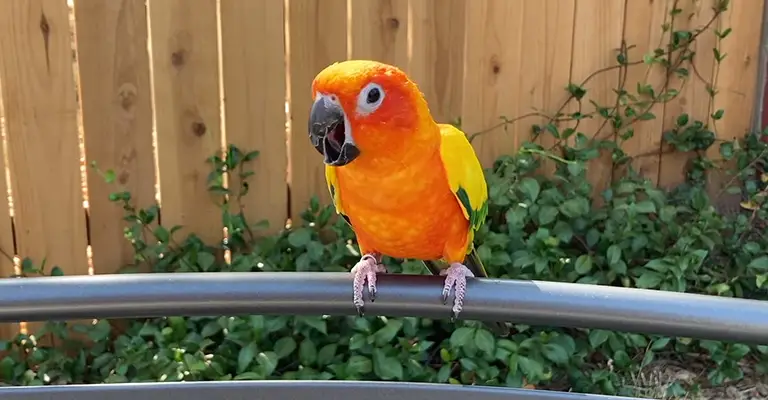
Can Sun Conures Talk?
Sun Conures, also known as Sun Parakeets (scientifically known as Aratinga solstitialis), are known for their vibrant plumage and outgoing personalities.
While they are highly intelligent and can mimic sounds, it’s important to note that they are not considered the most proficient talkers among parrot species.
Sun Conures have the ability to learn a limited vocabulary of words and phrases, but their speech capabilities may vary from bird to bird. Some individuals may develop a few words or simple phrases, while others may not show much inclination for talking.
If you’re interested in teaching your Sun Conure to talk, it’s essential to provide consistent and patient training. Regular interaction, repetition of words or phrases, and positive reinforcement with treats or praise can aid in the learning process.
While they may not be as proficient as some other parrot species like African Greys or Amazon Parrots, Sun Conures can still surprise their owners with their ability to mimic sounds and pick up a few words.
How to Teach a Sun Conure to Talk?
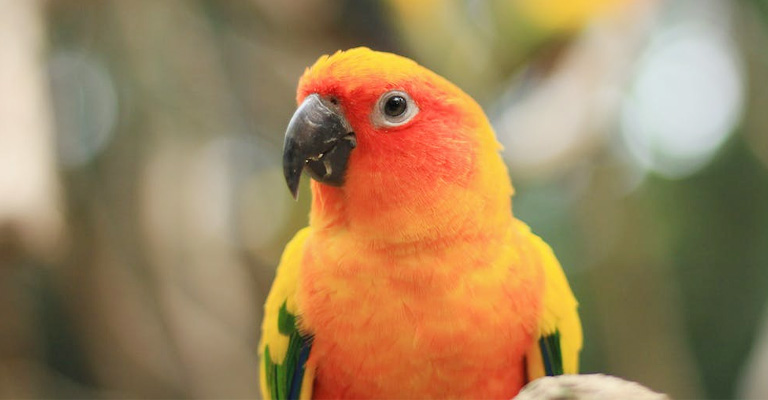
Before embarking on the journey of teaching your Sun Conure to talk, it’s essential to familiarize yourself with their natural vocalizations. Sun Conures are known for their loud and expressive calls, squawks, and screeches.
They communicate through a range of sounds and gestures, including whistling, trilling, and chattering. By observing and understanding their natural repertoire, you’ll be able to better appreciate and work with their vocal abilities.
Bond with Your Sun Conure
Establishing a strong bond with your Sun Conure is crucial for successful training. Spend quality time with your bird, interact with it, and create a positive and nurturing environment.
Sun Conures are highly social creatures and thrive on attention and affection. By developing a close relationship, your bird will be more receptive to learning and mimicry.
Start with Simple Words and Phrases
When teaching your Sun Conure to talk, start with simple words and phrases. Choose commonly used words or short phrases such as “hello,” “goodbye,” or the bird’s name.
Repeat these words consistently in a clear and enthusiastic manner. Reinforce the desired words with positive reinforcement, such as treats or praise, to encourage your Sun Conure to associate the words with positive experiences.
Create a Conducive Learning Environment
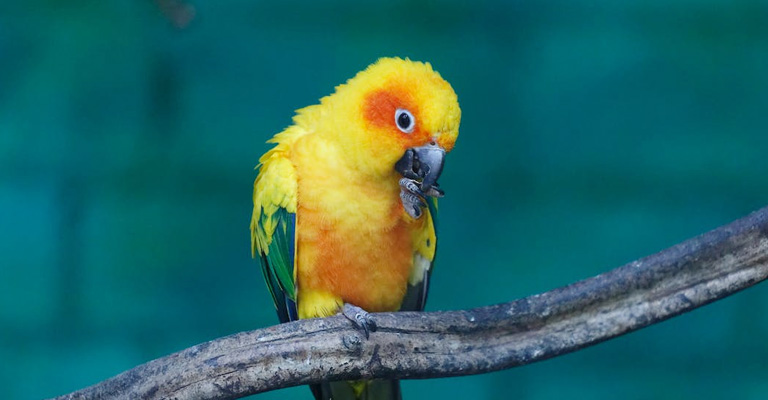
Eliminate distractions and create a calm and focused environment for training sessions. Ensure that you and your Sun Conure are in a quiet area with minimal background noise.
Turn off the television or any other devices that could hinder the learning process. By providing a distraction-free space, you can enhance your bird’s concentration and receptiveness to learning.
Use Repetition and Consistency
Consistency is key when teaching your Sun Conure to talk. Practice the chosen words or phrases with your bird daily. Repeating them multiple times during each training session will reinforce the sounds and help your bird grasp the meaning.
Be patient and persistent, as it may take weeks or even months for your Sun Conure to start imitating the words consistently.
Incorporate Visual Cues and Gestures
In addition to verbal repetition, you can enhance the learning process by using visual cues and gestures. Accompany the words with appropriate hand movements or facial expressions.
For instance, while saying “hello,” you can wave your hand or nod your head. Associating the words with visual cues helps your Sun Conure make connections between the sounds and actions, facilitating the learning process.
Provide a Diverse and Stimulating Environment
Expose your Sun Conure to a variety of sounds and stimuli to expand its vocabulary and mimicry skills. Play recordings of human speech or other birds vocalizing to introduce different sounds.
Additionally, interacting with your bird through toys, mirrors, or even other talking birds can encourage socialization and further stimulate its desire to communicate.
Be Patient and Celebrate Progress
Remember that each Sun Conure is unique and will progress at its own pace. Some birds may quickly learn to imitate words, while others may take longer. Avoid rushing the process or becoming frustrated.
Instead, celebrate even the smallest signs of progress, such as your Sun Conure attempting to repeat a sound or saying a word in a recognizable manner. Positive reinforcement and encouragement will motivate your bird to continue learning and improve its speaking skills.
Seek Professional Guidance If Needed
If you encounter challenges during the training process or if your Sun Conure does not show any progress over an extended period, consider seeking professional guidance from an avian behaviorist or an experienced bird trainer.
What Influences Talking Ability?
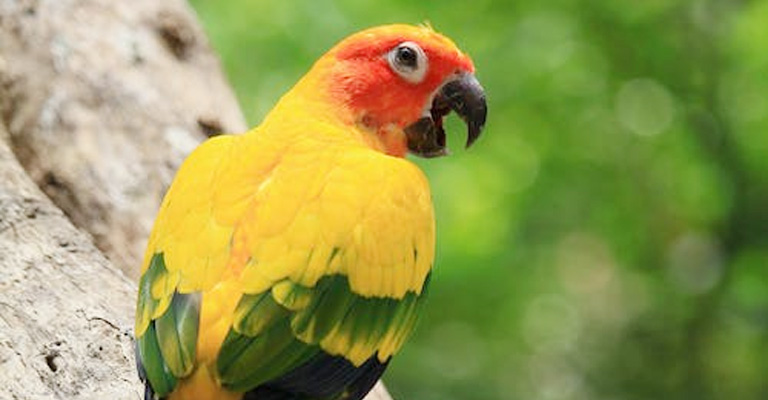
The talking ability of parrots, including Sun Conures, can be influenced by several factors. Here are some of the key factors that can impact their capacity to talk:
Species and Individual Variations
Different parrot species have varying levels of talking ability. Some species, such as African Greys and Amazon Parrots, are known for their exceptional talking skills, while others, like Sun Conures, may not be as proficient.
Intelligence and Learning Capability
Parrots are highly intelligent creatures. The ability to talk is closely linked to their cognitive abilities and learning capacity. Some birds are naturally more adept at imitating and mimicking sounds, making them more likely to pick up words and phrases.
Socialization and Interaction
Regular socialization and interaction with humans play a crucial role in a parrot’s ability to talk. Birds that have more exposure to human speech and interaction tend to have a better chance of learning and imitating words.
Age and Development
The age at which a parrot is exposed to training and language acquisition can influence their ability to talk. Young parrots have more flexible vocalizations and are generally better at learning new sounds and words. However, older parrots can still learn new vocalizations, albeit with potentially more effort and time.
Environment and Exposure
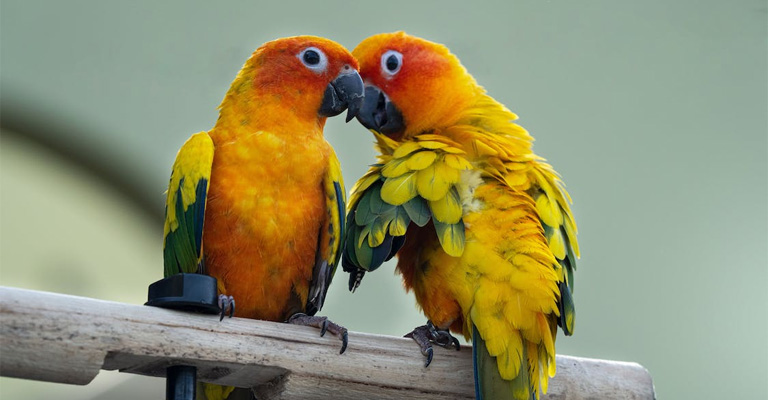
The environment in which a parrot is raised and the amount of exposure they have to different sounds and words can impact their talking ability.
Birds raised in a stimulating and enriched environment with a variety of sounds and interactions are more likely to develop better talking skills.
Training and Reinforcement
Consistent training and positive reinforcement techniques are crucial for teaching parrots to talk. Regular practice, repetition of words or phrases, and rewarding the bird for their efforts can significantly improve their language skills.
It’s important to note that while some parrots may develop an extensive vocabulary and excellent speech abilities, not all parrots will become proficient talkers. Each bird has its own unique personality, preferences, and capabilities when it comes to vocalizations and mimicry.
What To Do If Your Sun Conure Does Not Talk?
If your Sun Conure does not talk, here are some steps you can take:
Provide a Stimulating Environment
Ensure that your Sun Conure has a stimulating and enriching environment. Offer a variety of toys, perches, and activities to keep them mentally engaged and prevent boredom. An enriched environment can encourage vocalization and learning.
Socialize and Interact
Spend quality time with your Sun Conure, engaging in regular socialization and interaction. Talk to your bird using clear and distinct words and phrases. Read to them or play audio recordings of human speech to provide exposure to different sounds.
Training and Repetition
Implement consistent training sessions to encourage talking. Choose a few simple words or phrases and repeat them frequently during interactions with your bird.
Use positive reinforcement techniques, such as offering treats or praise, to reward your bird’s efforts when they make any vocalizations or attempts to mimic sounds.
Be Patient and Consistent
Teaching a bird to talk requires patience and consistency. Some birds may take longer to develop talking skills, so don’t get discouraged if your Sun Conure doesn’t start talking immediately.
Keep practicing and reinforcing their attempts, and over time, they may begin to pick up words.
Seek Professional Advice
If you’re having difficulty teaching your Sun Conure to talk, consider consulting an avian behaviorist or an experienced avian trainer. They can provide guidance, assess your bird’s specific situation, and offer personalized strategies to encourage talking.
Remember that not all individual birds will develop the same level of talking ability, and some birds may not talk at all. Each bird has its own unique personality and preferences.
As long as your Sun Conure is healthy, happy, and well-socialized, their talking ability, or lack thereof, should not be a cause for concern. Focus on fostering a loving and enriching bond with your feathered friend, regardless of their talking abilities.
FAQs
The time it takes for a Sun Conure to start talking can vary significantly. Some birds may begin mimicking sounds and words within a few weeks, while others may take several months or even longer.
While Sun Conures have the capability to mimic human speech, not all individuals will develop this skill. Some birds may show more interest and aptitude for talking, while others may prefer other forms of communication or simply not exhibit an interest in mimicking words.
Sun Conures can learn a variety of words and phrases. Some common words and phrases that owners have successfully taught their Sun Conures include greetings like “hello” and “goodbye,” their own names, simple commands like “step up” or “come here,” and expressions like “I love you” or “pretty bird.”
Yes, older Sun Conures can learn to talk, but it may require more patience and persistence compared to younger birds. With older birds, it’s important to create a positive and nurturing environment, establish a strong bond, and consistently practice the desired words or phrases.
Teaching a Sun Conure to talk does not pose any inherent risks or concerns. However, it’s essential to remember that talking should be a supplemental form of communication for the bird, not the primary one.
Final Words
That was all about Can Sun Conures talk. While not all Sun Conures will learn to talk, with patience, consistency, and the right training approach, many can develop the ability to mimic human speech.
Remember to establish a strong bond, start with simple words, create a conducive learning environment, use repetition and consistency, incorporate visual cues, provide a diverse environment, be patient, and celebrate progress.
With time and effort, you may soon find yourself engaged in delightful conversations with your talkative Sun Conure.